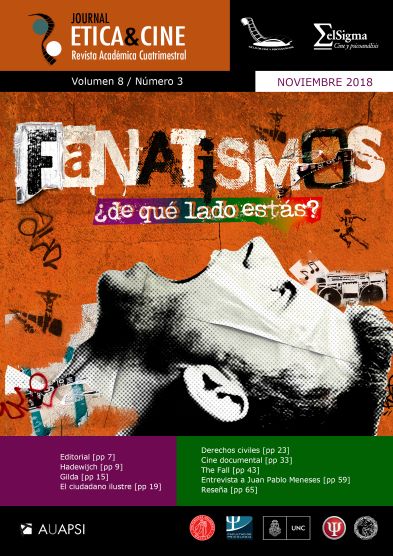Serial instincts
DOI:
https://doi.org/10.31056/2250.5415.v8.n3.22773Keywords:
TV series, Instincts, Serial killers, Cultural semiotics, TranslationAbstract
This article assumes that instinct proposes an expeditious solution for contemporary culture, homogenizing multiple manifestations from the protective intensity of the maternal and the irremissible loss of the sexual, to the unstoppable murderous yearning. Our hypothesis holds that this category is conformed as a “semiotic scaffolding” whose function would be to translate human irrationality. In dialogue with the semiologist Yuri Lotman and the philosopher Michel Foucault, we will say that artistic texts such as TV series will be a fertile ground for questioning how hypothetical instincts are reactivated, around a notion of “anomaly” and the complex mechanisms that ensure their domestication and control. We will analyze The Fall, narrative where the polyhedral construction of an instinct in the fictional figure of the serial killer does not flow in an isolated manner, since sexuality appears to conform a complex instinctual order. In this sense, the story captures that the problem of instinct recalls individual and collective identities, as well as regimes that sustain them. Based on this, instinct would be partially detached from its biological character, becoming semiotic category of analysis: textual operative that allows to attend to cognitive domains, and to show ethical aspects in a deterministic understanding of subjectivities on which each cultures inscribe meanings.References
Ardrey, R. (1976) La evolución del hombre: la hipótesis del cazador. Madrid: Editorial Alianza.
Bakhtin, M. (2008[1953]) Estética de la Creación Verbal. Buenos Aires: Siglo XXI.
Bartra, R. (2013) Antropología del cerebro. Conciencia, cultura y libre albedrío. Barcelona: Pre-Textos.
Bateson, G. (1998[1985]) Pasos hacia una ecología de la mente. Buenos Aires: Lumen-Lohlé.
Besuschio, A. (2014) “Prólogo”. En J. Bafico (Ed.). El origen de la monstruosidad (3-18). Buenos Aires: Indicios.
Blumberg, M. (2005) Basic Instinct: The Genesis of Behaviour. New York: Thunders Mouth Press.
Cubitt, A. [creador]; Verbruggen, J. [director] (2013) The Fall [serie televisiva]. Reino Unido: BBC Northern Ireland.
Dawkins, R. (2002[1976]) El gen egoísta. Las bases biológicas de nuestra conducta. Barcelona: Salvat.
De Waal, F. (2013) El bonobo y los diez mandamientos. En busca de la ética entre los primates. Buenos Aires: Tusquets Editores.
Foucault, M. (2002) Los anormales. Curso en el Collège de France
1974-1975. Buenos Aires: Siglo XXI.
Foucault, M. (2014) Las redes de poder. Buenos Aires: Prometo Libros.
Freud, S. (1989[1920]) “Beyond the Pleasure Principle”. En The Freud Reader (594-625). Traducción por Peter Gay. New York: Norton & Company Inc.
Fromm, E. (1975) Anatomía de la destructividad humana. México: Editorial Siglo XXI.
Gallardo, M. (2011) Evolución. El curso de la vida. Buenos Aires: Panamericana.
Gómez Ponce, A. (2017) Depredadores. Fronteras de lo humano y series de TV. Córdoba: Editorial Babel.
Hoffmeyer, J. (2011) “Biology is Immature Biosemiotics”. En Kull, Kalevi y Emmeche, Claus (Eds.). Towards a Semiotic Biology. Life is the Actions of Sings (43-66). Londres: Imperial College Press.
Kristeva, J. (2001). Historia de amor. Buenos Aires: Siglo XIX.
Lapanche, J. y Pontalis, J. (1996). Diccionario de psicoanálisis. Buenos Aires: Paidós.
Lorenz, K. (1975[2005]) Sobre la agresión: el pretendido mal. México: Siglo XXI.
Lotman, Y. (1990). The Universe of the Mind. Londres: Indiana University Press.
Lotman, Y. (1978[1998]). La Semiosfera II. Madrid: Ediciones Frónesis Cátedra.
Ressler, R. et al (2005). Crime Classification Manual. A Standard System for Investigating and Classifying Violent Crimes. Segunda edición. San Francisco: Jossey-Bass Publishing.
Rosa, N. (2006). Relatos críticos. Cosas, animales, discursos. Buenos Aires: Santiago Arcos.
Downloads
Published
Issue
Section
License
Los autores que publiquen en Ética y Cine Journal aceptan las siguientes condiciones:
Los autores/as conservan los derechos de autor © y permiten la publicación a Ética y Cine Journal, bajo licencia CC BY-SA / Reconocimiento - Reconocimiento-CompartirIgual 4.0 Internacional. La adopción de esta licencia permite copiar, redistribuir, comunicar públicamente la obra, reconociendo los créditos de la misma, y construir sobre el material publicado, debiendo otorgar el crédito apropiado a través de un enlace a la licencia e indicando si se realizaron cambios.

Este obra está bajo una licencia de Creative Commons Reconocimiento-CompartirIgual 4.0 Internacional.




